ChatGPT for Keyword Research | ChatGPT for Professionals - Software Development PDF Download
Introduction
Keyword research is the process of discovering words and phrases that people use to search for information online. It is an essential part of any successful SEO (Search Engine Optimization) strategy, so the same goes if you want to use ChatGPT for SEO purposes.
- By understanding what people are searching for, you can create content that is more likely to be found by the right people. This helps to increase website traffic and improve your website’s visibility in search engine results.
- Keyword research also helps you to identify potential topics for content creation, as well as to identify potential competitors and their strategies.
- In addition, keyword research can provide valuable insights into the needs and interests of your target audience. This can help you to create content that is more relevant and engaging to your readers.
By understanding what people are looking for, you can create content that is more likely to be shared and linked to, which can help to improve your website’s ranking. Ultimately, keyword research is an important part of any SEO strategy and can help to ensure that your website is seen by the right people.
Different types of keyword research and analysis
There are several different types of keyword research and analysis that can be used to identify the best keywords for your website.
Types of Keyword Research and Analysis:
- Keyword Discovery: Identifying the most popular and relevant terms used by your target audience.
- Competitor Analysis: Analyzing the keywords used by your competitors to determine what terms they are targeting.
- Search Volume Analysis: Estimating the number of searches for a particular keyword or phrase.
- Keyword Difficulty Analysis: Determining the difficulty of ranking for a particular keyword or phrase.
- Long-Tail Keyword Research: Identifying longer, more specific search terms that are less competitive.
- Keyword Clustering: Grouping related keywords together to create more targeted content (this term is also what my colleague Torbjørn Flensted wrote his book about Topic Clusters around).
Using ChatGPT for Keyword Research
So how can you then use ChatGPT to find good and relevant keywords? (if have been living under a rock or just want to know what ChatGPT is, then read our article on it)
In order to utilize ChatGPT in the best manner for the job, it might be useful to understand the difference between ChatGPT and some of the classic tools used for keyword research.
One would normally use tools like:
- Google Keyword Planner
- Google Search Console
- Ahrefs
- Storybase
- SEO.ai (yes, putting it here as one normally used might be a stretch, but we do actually have a keyword finder function)
These tools (except maybe #5) mainly rely on access to big databases over queries. One can then try to find the best keywords for a certain topic by looking at related keywords or long-tail keywords containing the initial keywords in the database. For a keyword like 'yoga exercises' it might look something like this:
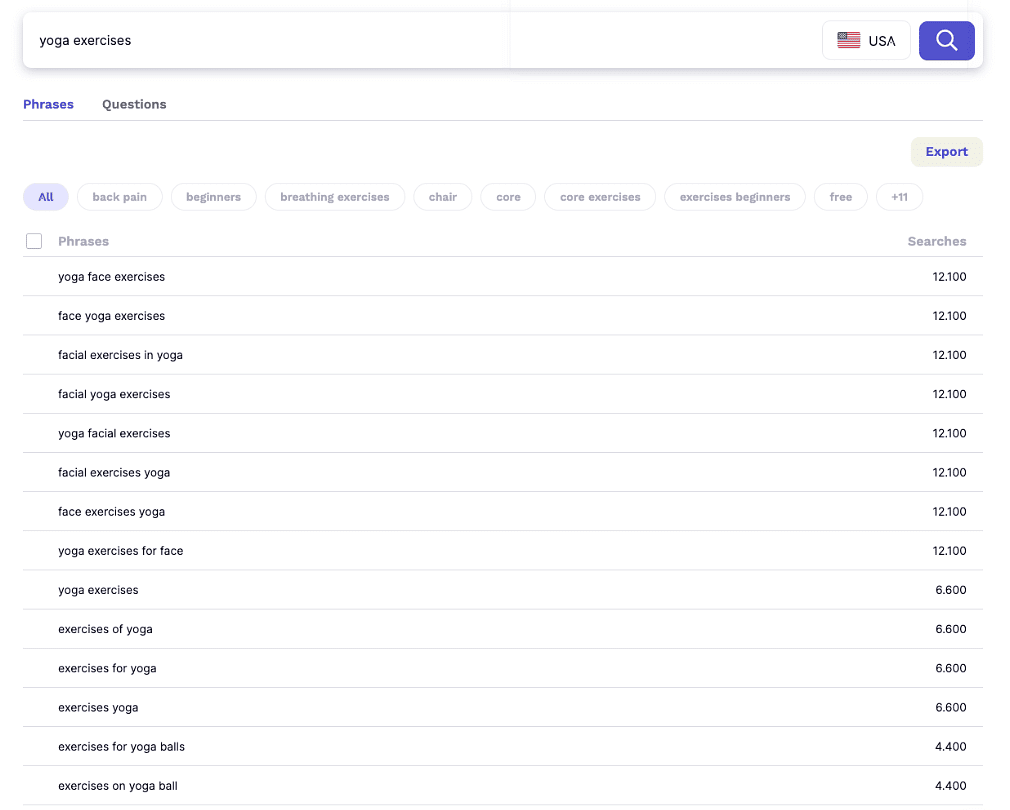
This approach is a rather linear approach.
If one tries Google own Keyword Planner (now part of their ads product) the result is this:
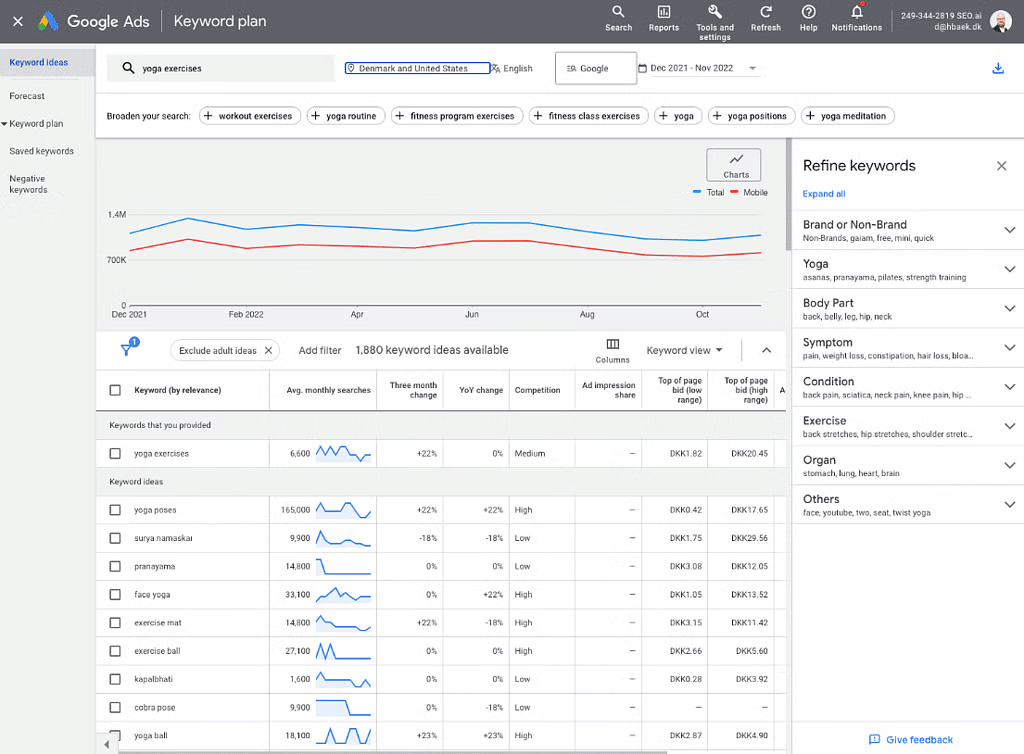
Here it's evident that Google is also connecting keywords that might now contain the phrase 'yoga exercises' but still is relevant. Most likely by a combination of algorithmic understanding of yoga and associated concepts as well as actual data on what people searching for 'yoga exercises' is also searching for.
When we turn to ChatGPT, it can only use natural language processing (NLP) to understand the context of a query and then suggest related keywords. This means that it can provide a different type of suggestion than traditional keyword research tools, but is also limited as it does not have actual search data.
Let's dive into some examples and compare them to the earlier-mentioned strategies.
Keyword Discovery:
ChatGPT can be used for Keyword Discovery by simply asking ChatGPT for relevant keyword. This could be a prompt like "Make a list with keyword related to 'yoga exercises' that one might use to search in Google".
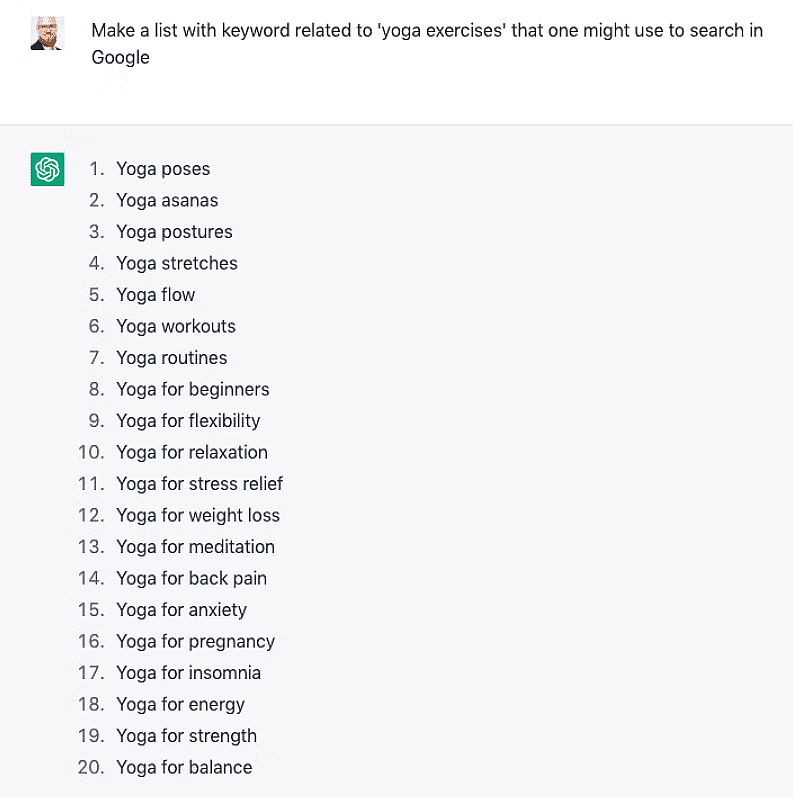
One could then either also for more keywords or expand the prompt with audience specifications either in the chat format ask something like "Revise the list with the audience pregnant women in mind" or it could have been included in the initial prompt.
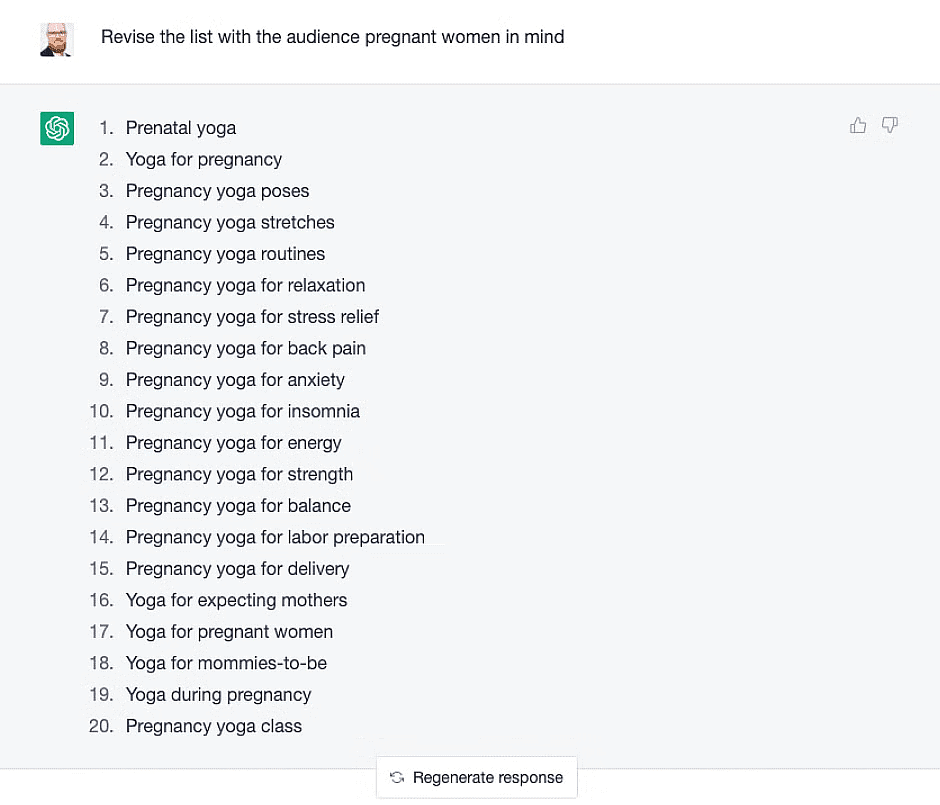 This is surprisingly flexible and only the imagination is the limit of directions one take can. But it illustrates that this is either mainly for finding keywords, where one is not looking for keyword suggestions in a thousandfold like some bigger websites, might do. And some of us who love having thousands of keywords in Google Sheets or Excel might find these questions back and forth for specification quite slow and low level. But to the ones that do not love spreadsheets, ChatGPT might be a good way to make advanced queries and combinations. In this way Twitter user KK uses ChatGPT to swap the noun in a search phrase, and then generate a list with the search phrase for all US states.
This is surprisingly flexible and only the imagination is the limit of directions one take can. But it illustrates that this is either mainly for finding keywords, where one is not looking for keyword suggestions in a thousandfold like some bigger websites, might do. And some of us who love having thousands of keywords in Google Sheets or Excel might find these questions back and forth for specification quite slow and low level. But to the ones that do not love spreadsheets, ChatGPT might be a good way to make advanced queries and combinations. In this way Twitter user KK uses ChatGPT to swap the noun in a search phrase, and then generate a list with the search phrase for all US states.
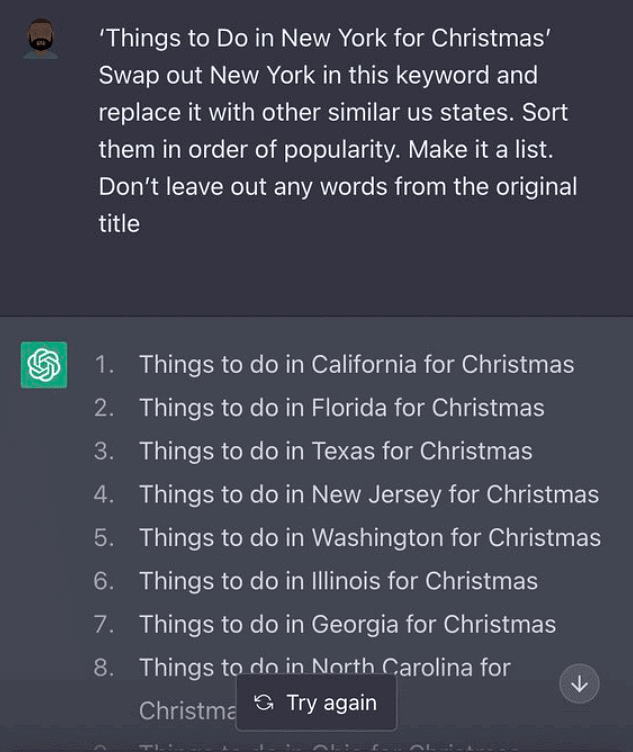
A clear downside and missing element when using ChatGPT is the search volume for each keyword. Something most SEOs normally use as the determining factor on how to identify which keyword to target.
Competitor Analysis:
You are not able to get a list of actual keywords a competitor is ranking on by just inputting their URL as you would be on Ahref or other similar tools. What you instead can do that taste a bit like a competitor analysis is feedback ChatGPT the text of their page and then ask it to extract the keywords. So open the competing page, mark everything, copy it, open ChatGPT and start a prompt with a string like "Make list of the 20 most essential keywords in the following text:" followed by the pasted text.
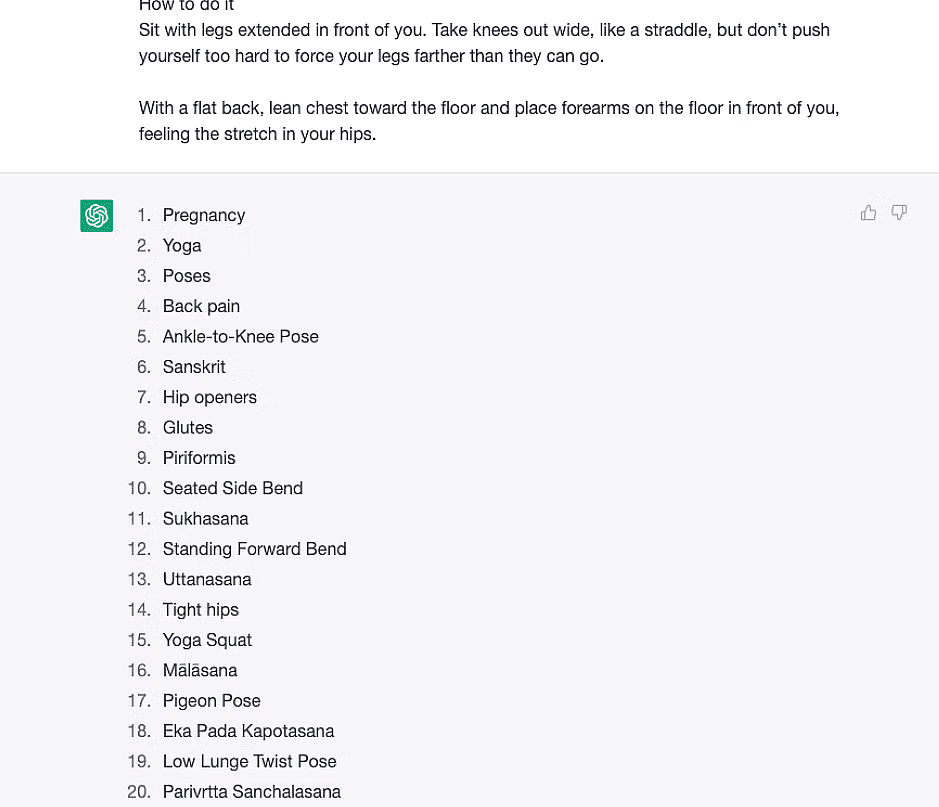
This is of course quite a labor intensive and also be aware that there are limits to how long a page you can copy/paste in one go without ChatGPT throwing an error back at you.
Search Volume Analysis:
As already mentioned ChatGPT does not contain the actual numbers of each search query. If you ask it it will state that you should try a different tool.
I'm sorry, but I am unable to browse the internet or access search volume data. However, you can use tools such as the Google Keyword Planner to estimate the search volume for specific keywords. (quote)
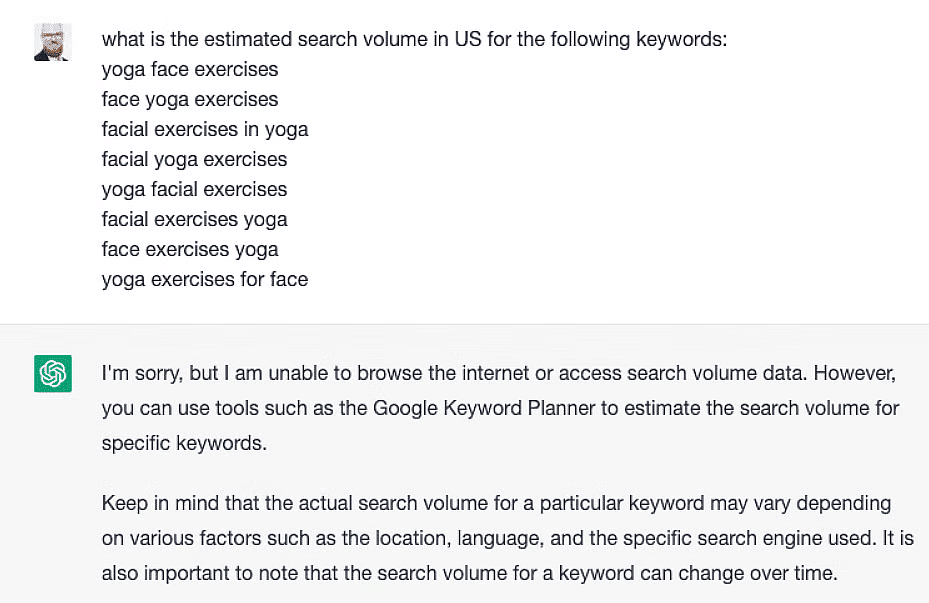 Keyword Difficulty Analysis:
Keyword Difficulty Analysis:
As we have already by now covered multiple times, ChatGPT does not have access to real search data and you might think that it can't be used for benchmarking keyword difficulty. And you might be somehow right.
When ask it in a prompt to give it a go anyway - "which of the following keywords might be the most difficult to rank high as number 1 in Google on? - it will actually try to resonate in order to provide you with an answer. And then try to turn the question into a broader subject (how to rank on Google) that it can state something about.
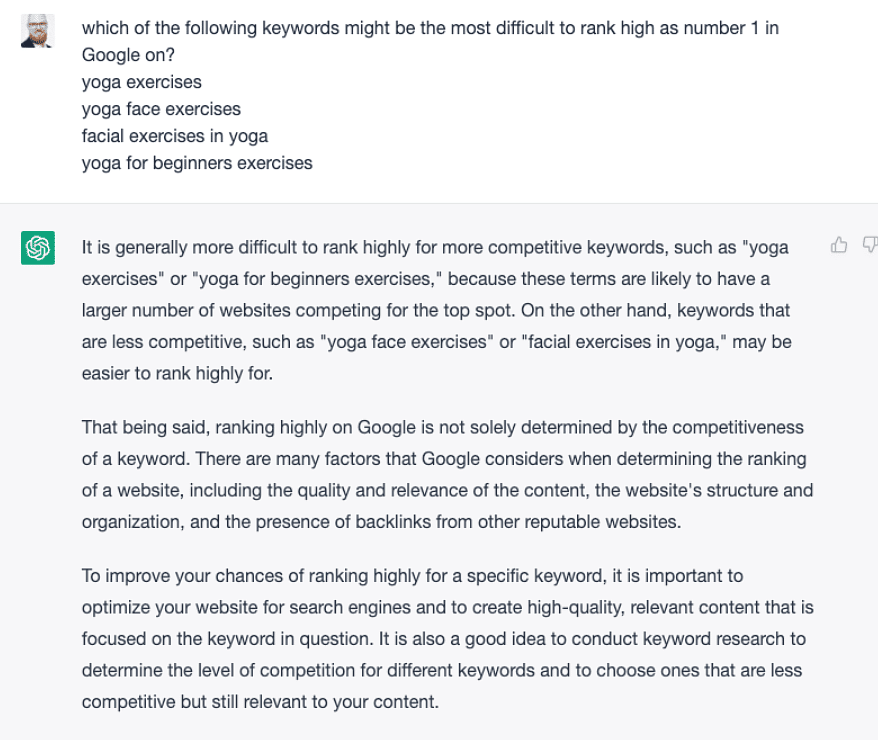
 |
Download the notes
ChatGPT for Keyword Research
|
Download as PDF |
Long-Tail Keyword Research:
Finding long-tail keywords is one of the keyword research disciplines that ChatGPT is actually capable of assisting with.
Just input a prompt like "make a list of long-tail keywords based on the primary keyword 'yoga exercises'"
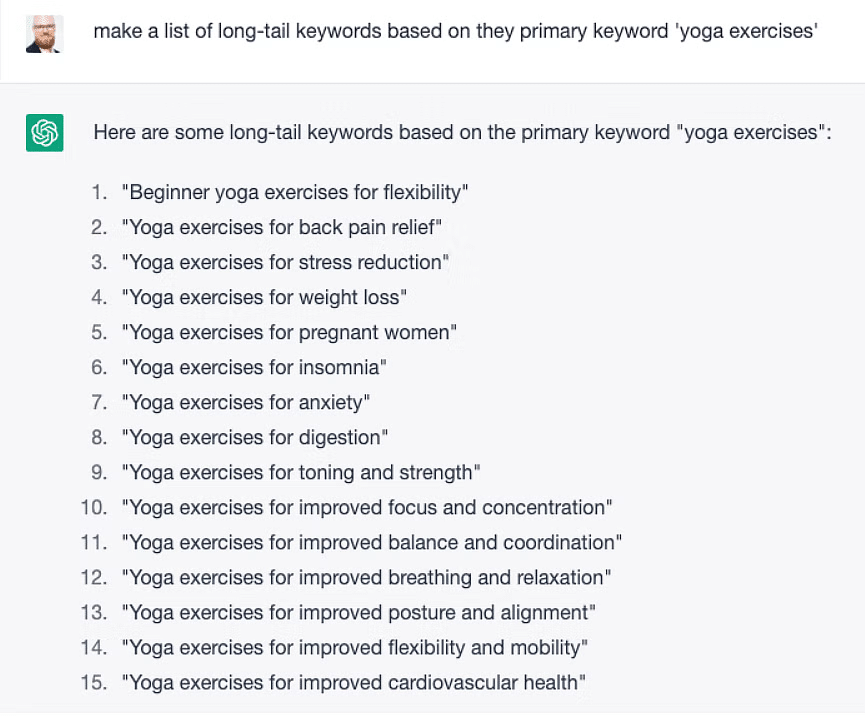
An option is then to ask ChatGPT to provide different versions of this with prompts like "Revise list so it's not directly the words 'Yoga exercises' that is used, but related terms and phrases".
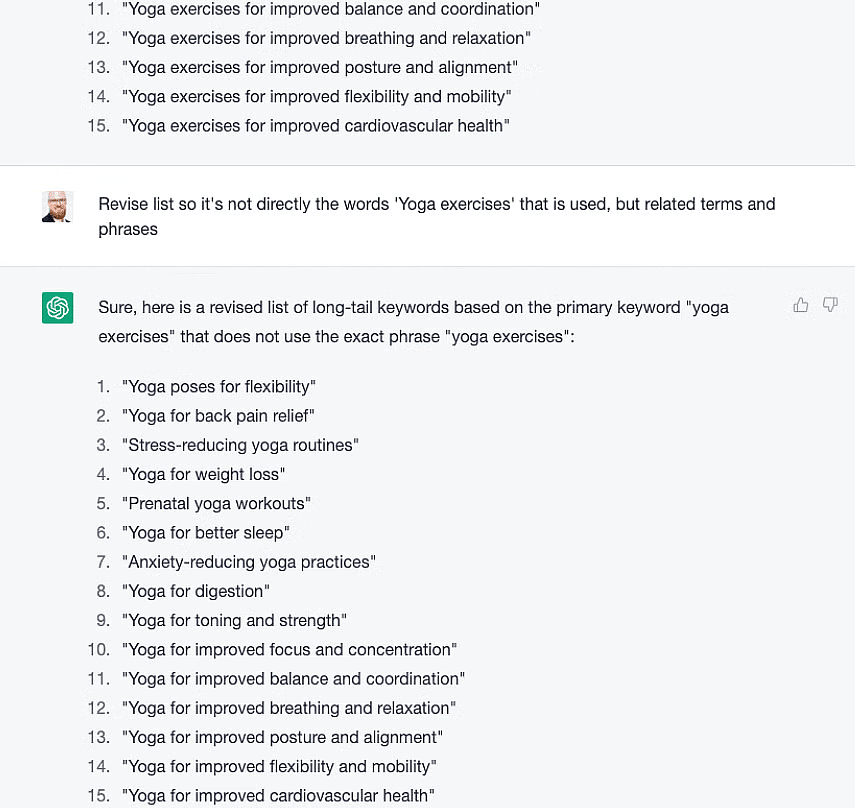
Keyword Clustering:
Grouping related keywords can often be a manual process. But a strong language understanding (remember, ChatGPT is built on GPT- 3 which is among the most advanced language algorithm ever to be seen) is support this quite well
My colleague Torbjørn tested the capabilities of the ChatGPT platform to see if it could help classify the purpose of searches for different keywords into search intent. To use my 'yoga' related examples a prompt like "Take these keywords and put a keyword search intent on each keyword. Output as a table." would result in this.
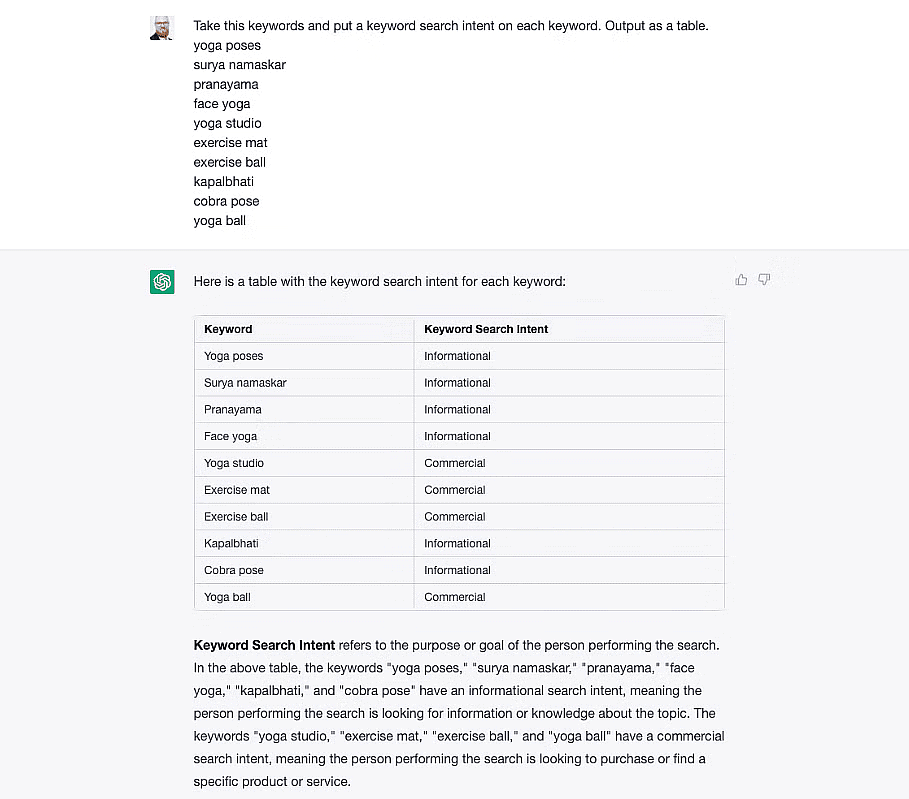
Another way to make clusters is to ask ChatGPT for grouping keywords. Either with a list of keywords or when generating keywords. A prompt could be "What are good keywords, grouped by category, that I could help to rank my Yoga studio".
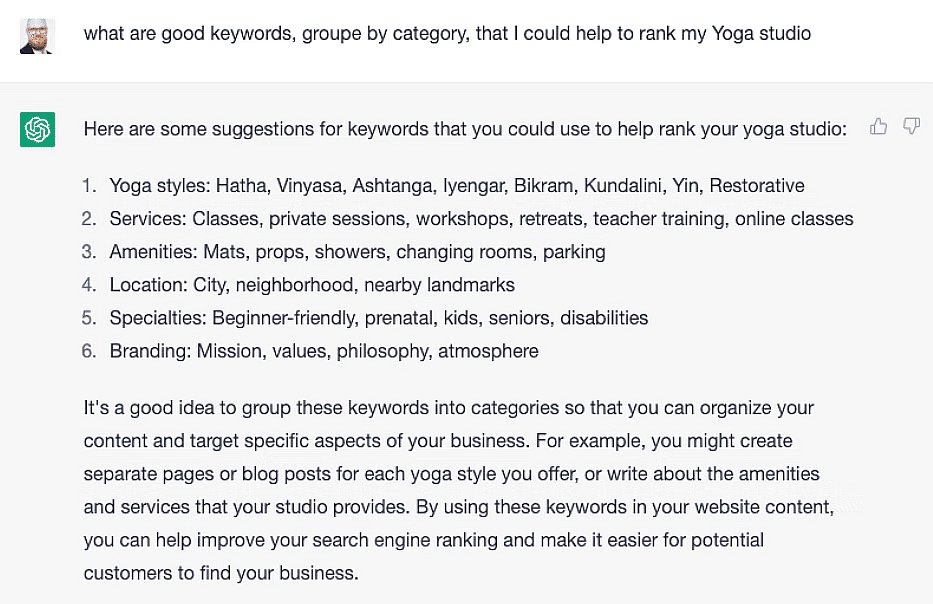
As this might seem very practical and magical how good the language understanding is, the chat interface might be the main challenge for an SEO marketer. When you want to work with keyword clustering within SEO, it's most often because you have hundreds, if not thousands of pages. Something that is not practical to handle with ChatGPT.
|
7 videos|31 docs
|
FAQs on ChatGPT for Keyword Research - ChatGPT for Professionals - Software Development
| 1. What are the different types of keyword research and analysis? |  |
| 2. How can ChatGPT be used for keyword research? |  |
| 3. What are some frequently asked questions about keyword research and analysis? |  |





















